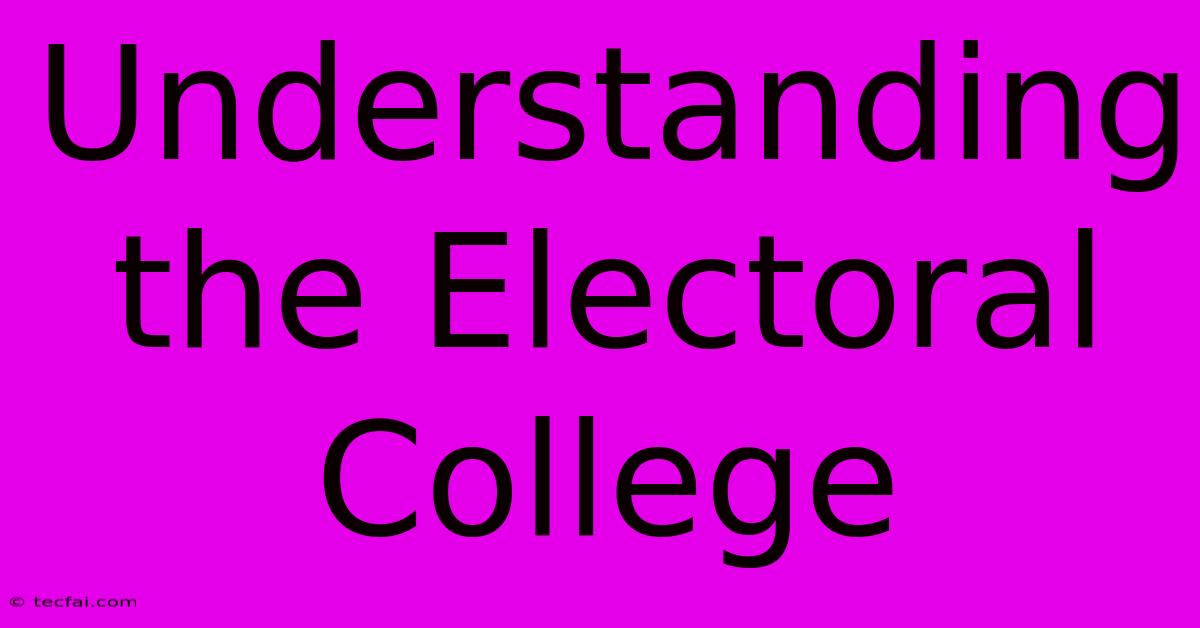Understanding The Electoral College

Discover more detailed and exciting information on our website. Click the link below to start your adventure: Visit Best Website tecfai.com. Don't miss out!
Table of Contents
Understanding the Electoral College: How the US President is Really Elected
The United States Presidential election is a complex process, and one of the most confusing aspects is the Electoral College. While most people know that the winner of the popular vote doesn't always win the presidency, the intricacies of the system often remain shrouded in mystery. This article will delve into the Electoral College, explaining how it works and why it exists, while exploring some of the ongoing debates surrounding it.
How Does the Electoral College Work?
The Electoral College is a body of electors established by the United States Constitution, constituted every four years for the sole purpose of electing the President and Vice President of the United States. Each state is allocated a number of electors equal to the total number of senators and representatives it has in Congress. The District of Columbia is allotted three electors, as if it were a state.
Here's how the process unfolds:
-
The Presidential Election: In November, citizens cast their vote for their preferred presidential candidate. These are known as the "popular vote".
-
State-Based Allocation: Each state's electoral votes are awarded to the presidential candidate who wins the popular vote in that state, with the exception of Maine and Nebraska, which use a proportional system.
-
Reaching the Magic Number: A candidate needs to secure a majority of the 538 electoral votes (270 votes) to win the presidency.
-
The Electoral College Meeting: In December, electors meet in their respective states and cast their votes.
-
Official Election: The votes are sent to Congress, where they are tallied and certified. The candidate with the majority of electoral votes is declared the winner.
Why Does the Electoral College Exist?
The Electoral College system was established by the Founding Fathers for a few key reasons:
- Compromise: It was a compromise between those who wanted a direct popular vote and those who wanted the president to be chosen by Congress.
- Protection of Smaller States: The system ensures that smaller states have a voice in the election, as they are guaranteed at least three electoral votes regardless of their population size.
- Preventing Tyranny of the Majority: The system was designed to prevent a candidate from winning solely based on the votes of a few densely populated areas.
Arguments for and Against the Electoral College
The Electoral College remains a hotly debated topic, with proponents and opponents fiercely arguing their case.
Arguments in Favor:
- Protects Smaller States: It gives smaller states a greater say in the election than they would have under a popular vote system.
- Encourages a National Campaign: Candidates are incentivized to campaign in all states, not just heavily populated areas.
- Avoids Runaway Elections: The system can prevent a candidate from winning with a narrow majority in a few key states.
Arguments Against:
- Undemocratic: The winner of the popular vote doesn't always win the presidency, which some view as undemocratic.
- Faithless Electors: There is no guarantee that electors will vote for the candidate they are pledged to, although this has rarely occurred in practice.
- Winner-Takes-All System: The winner-take-all system in most states means that even a small margin of victory can result in a large number of electoral votes, potentially distorting the national popular vote.
The Future of the Electoral College
The debate surrounding the Electoral College is likely to continue. Some argue that the system is outdated and needs to be reformed or abolished, while others believe it's an essential safeguard against tyranny and a fair representation of all states. While reform or abolition might be difficult, the ongoing discourse ensures that the system remains a subject of national discussion and scrutiny.
Understanding the Electoral College is crucial for every citizen, as it directly impacts who becomes President of the United States. While it remains a complex and controversial system, it's a key element of the American political landscape.

Thank you for visiting our website wich cover about Understanding The Electoral College. We hope the information provided has been useful to you. Feel free to contact us if you have any questions or need further assistance. See you next time and dont miss to bookmark.
Featured Posts
-
Melbourne Cup Analyzing Pedigree For Winning Horse
Nov 05, 2024
-
New Telegram Game Paws Boasts 20 M Users
Nov 05, 2024
-
Joe Rogans Trump Endorsement Before Vote
Nov 05, 2024
-
Tech Workers Strike At New York Times
Nov 05, 2024
-
Who Are Donald Trumps Family Members
Nov 05, 2024
